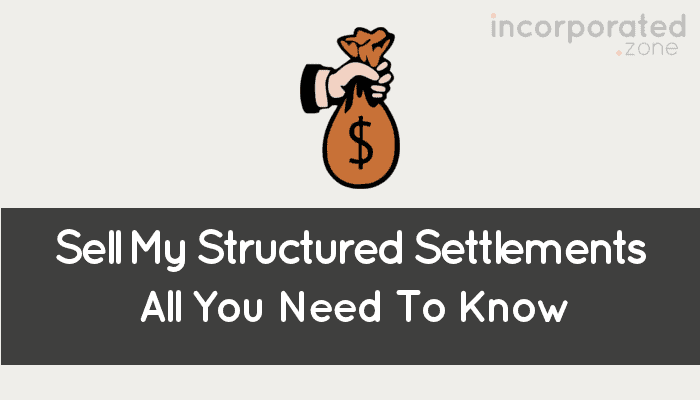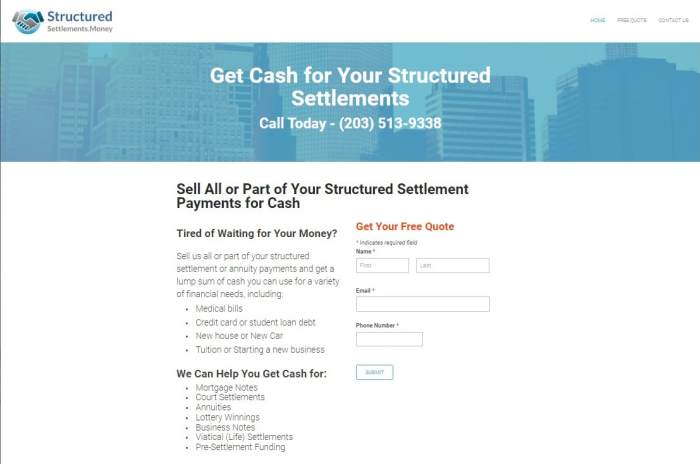Sell structured insurance settlements – The process of selling a structured settlement involves transferring the rights to future payments from an insurance policy to a third party, typically a factoring company or a specialized investment firm. This can provide immediate liquidity to the recipient, who might need funds for various reasons, while the buyer receives a discounted rate of return on their investment. This guide offers a detailed, comprehensive, and -friendly overview of selling structured settlements, covering crucial aspects for both sellers and potential buyers.
Understanding Structured Settlements
Structured settlements are often the result of personal injury lawsuits or wrongful death claims. Instead of receiving a lump-sum payment, the claimant receives a series of payments over a defined period, often many years. These payments are designed to provide long-term financial security, covering medical expenses, lost wages, and other related costs. However, circumstances may arise where immediate access to these funds becomes necessary.

Source: incorporated.zone
Benefits of Structured Settlements, Sell structured insurance settlements
- Tax Advantages: Payments from structured settlements are often tax-free, a significant benefit compared to receiving a lump-sum settlement that may be subject to substantial taxes.
- Financial Security: Provides a predictable stream of income, mitigating the risk of mismanaging a large lump sum.
- Protection from Creditors: In many jurisdictions, structured settlement payments are protected from creditors.
Reasons to Sell a Structured Settlement
While structured settlements offer significant advantages, there are situations where selling a portion or all of the future payments becomes a viable option. These may include:
- Immediate Financial Needs: Unexpected medical expenses, home repairs, business opportunities, or debt consolidation are common reasons.
- Investment Opportunities: The seller may seek to invest the lump-sum payment in higher-yielding opportunities.
- Changing Circumstances: Life changes such as divorce, job loss, or unforeseen emergencies can necessitate immediate access to funds.
The Process of Selling a Structured Settlement
Selling a structured settlement is a complex process that requires careful consideration and professional guidance. It’s crucial to understand the implications before making a decision.
Finding a Reputable Buyer
It is vital to work with a reputable and licensed structured settlement purchasing company. These companies specialize in evaluating and purchasing structured settlements. Thoroughly research potential buyers, checking for licenses, reviews, and their history of fair dealings. Beware of companies that promise unrealistic returns or high-pressure sales tactics.
Valuation and Negotiation
The buyer will conduct a thorough valuation of the structured settlement, considering factors such as the remaining payment amounts, the discount rate, and the remaining payment schedule. Negotiation will determine the final purchase price, which will be less than the present value of the future payments due to the time value of money and the buyer’s risk.
Legal and Regulatory Compliance
The sale of a structured settlement is subject to legal and regulatory requirements, including court approval in many jurisdictions. A qualified attorney specializing in structured settlements can guide you through the legal process, ensuring compliance with all applicable laws and regulations. This often involves filing a petition with the court to obtain approval for the assignment.
Due Diligence and Transparency
Before accepting any offer, conduct thorough due diligence on the buyer. Review all documents carefully, understand all fees and charges, and ensure complete transparency throughout the process. Ask questions and seek clarification on any aspect you don’t fully understand.
Factors Affecting the Purchase Price
Several factors influence the purchase price offered for a structured settlement:
- Remaining Payment Amount: The larger the remaining payment amount, the higher the purchase price.
- Discount Rate: This reflects the buyer’s risk and return expectations. A higher discount rate will result in a lower purchase price.
- Payment Schedule: Longer payment schedules generally result in lower purchase prices due to increased risk and the time value of money.
- Interest Rates: Prevailing interest rates in the market influence the discount rate used in valuation.
- Creditworthiness of the Settlor: While the payments are usually assigned, the creditworthiness of the original claimant may still be a factor in some cases.
Alternatives to Selling: Sell Structured Insurance Settlements
Before deciding to sell, consider alternative options, such as:
- Loan Against Structured Settlement: This allows you to borrow against the future payments without selling them outright.
- Financial Counseling: A financial advisor can help you create a budget and manage your finances effectively.
Frequently Asked Questions (FAQ)
- Q: Is selling a structured settlement legal? A: Yes, it is legal in most jurisdictions, but it requires court approval in many cases.
- Q: How much can I get for my structured settlement? A: The amount depends on several factors, including the remaining payment amount, the discount rate, and the payment schedule. A professional valuation is necessary.
- Q: What are the tax implications of selling a structured settlement? A: Generally, the proceeds from the sale are taxable as ordinary income, but there are exceptions depending on your specific circumstances. Consult a tax professional for guidance.
- Q: How long does the selling process take? A: The process can take several weeks or months, depending on the complexity of the settlement and the court approval process.
- Q: Do I need a lawyer? A: It’s highly recommended to have an attorney specializing in structured settlements to guide you through the legal aspects of the sale.
Resources
- Investopedia: Structured Settlement
- Nolo: Structured Settlements
- (Add other relevant and reputable sources here)
Conclusion
Selling a structured settlement can be a complex financial decision. Careful consideration of all factors, professional guidance from legal and financial experts, and thorough research are essential to ensure a fair and transparent transaction. Remember to always prioritize working with reputable companies and seeking legal counsel before proceeding.
Call to Action
Ready to explore your options for selling your structured settlement? Contact us today for a free, no-obligation consultation. We can help you understand your options and navigate the process with confidence.
Helpful Answers
What are the potential tax implications of selling a structured settlement?
Selling a structured settlement may result in tax liabilities on the difference between the sale price and the original present value of the payments. It’s crucial to consult with a tax professional to understand the potential tax consequences.
Are there any fees associated with selling a structured settlement?
Yes, companies purchasing structured settlements typically charge fees, which can vary depending on the terms of the agreement. These fees should be clearly Artikeld in any contract.
How long does the process of selling a structured settlement take?
The timeframe can vary, but generally, the process can take several weeks or even months, depending on the complexity of the settlement and the involved parties.
What happens if I change my mind after agreeing to sell?

Source: boomjanetwork.com
Most contracts include a rescission period, allowing a limited time to cancel the agreement. However, this timeframe is usually short, so it’s important to be certain before signing.
